最新Unit 1 Never Give In, Never, Never, Never习题答案综合教程四资料
- 格式:doc
- 大小:36.00 KB
- 文档页数:6
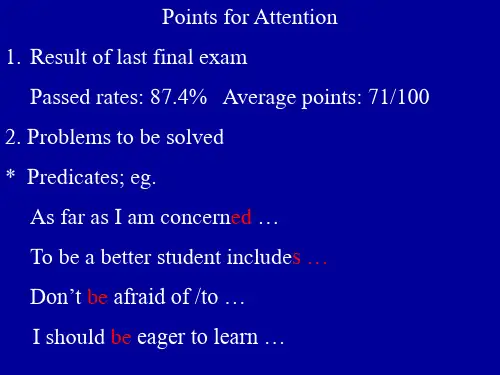
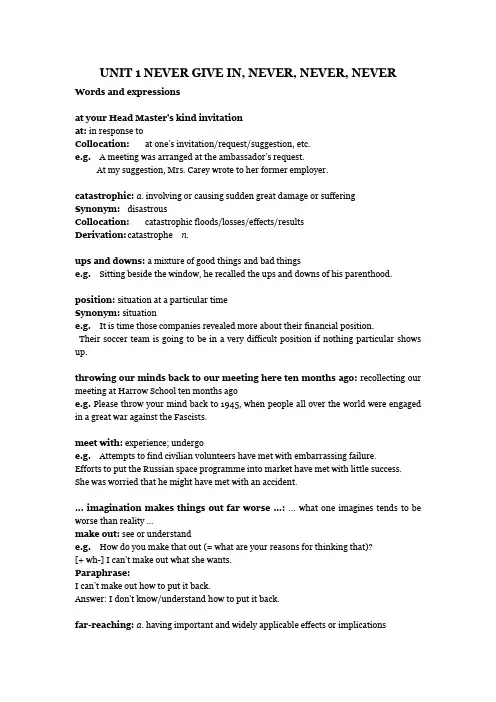
UNIT 1 NEVER GIVE IN, NEVER, NEVER, NEVER Words and expressionsat your Head Master’s kind invitationat: in response toCollocation:at one’s invitation/request/suggestion, etc.e.g. A meeting was arranged at the ambassador’s request.At my suggestion, Mrs. Carey wrote to her former employer.catastrophic:a. involving or causing sudden great damage or sufferingSynonym: disastrousCollocation:catastrophic floods/losses/effects/resultsDerivation:catastrophe n.ups and downs: a mixture of good things and bad thingse.g.Sitting beside the window, he recalled the ups and downs of his parenthood.position: situation at a particular timeSynonym: situatione.g.It is time those companies revealed more about their financial position.Their soccer team is going to be in a very difficult position if nothing particular shows up.throwing our minds back to our meeting here ten months ago: recollecting our meeting at Harrow School ten months agoe.g. Please throw your mind back to 1945, when people all over the world were engaged in a great war against the Fascists.meet with: experience; undergoe.g.Attempts to find civilian volunteers have met with embarrassing failure.Efforts to put the Russian space programme into market have met with little success. She was worried that he might have met with an accident.... imagination makes things out far worse ...: ... what one imagines tends to be worse than reality ...make out: see or understande.g.How do you make that out (= what are your reasons for thinking that)?[+ wh-] I can’t make out what she wants.Paraphrase:I can’t make out how to put it back.Answer: I don’t know/understand how to put it back.far-reaching:a. having important and widely applicable effects or implicationsCollocation: far-reaching consequences/implications/changes/reformse.g. The consequences of the decision will be far-reaching.They decided to carry on far-reaching constitutional reforms.conviction: n.a strong opinion or beliefCollocation: political/moral convictionse.g.She was motivated by deep religious convictions.In face of difficulty, he held a conviction that all would be well in the end.[U] the feeling or appearance of believing sth. strongly or of being sure about ite.g.He said he agreed but his voice lacked conviction.The leader’s speech in defense of the policy didn’t carry much conviction.yield:v.yield (to sth./sb.): (formal or literary) give up control (of)Synonym: surrendere.g. After a long siege, the town was forced to yield.He reluctantly yielded to their demands.If the newly founded regime does not yield, it should face sufficient military force to ensure its certain defeat.I yielded to temptation and had a chocolate bar.Paraphrase:Never yield to the apparently overwhelming might of the enemy.Answer: Never give in or surrender to the seemingly strong enemy.overwhelming:a. very great in amounte.g. The evidence against him was overwhelming.She had the almost overwhelming desire to tell him the truth.Derivation:overwhelm: v. defeat or make powerless (usu. a group of people) by much greater force of numbers; e.g. to overwhelm the opposing armypersevere:v. continue in a course of action even in the face of difficulty or with little or no indication of successCollocation: persevere (in sth. / in doing sth.); persevere (with sth./sb.)e.g.Despite a number of setbacks, they persevered in their attempts to fly around the world in a balloon.She persevered with her violin lessons.Derivations: persevering a.; perseverance n.compliment:v. politely congratulate or praise (sb.) for sth.Collocation: compliment sb. (on sth.)e.g. She complimented him on his excellent German.Comparison: compliment & complementThese words have similar spellings but completely different meanings.If you compliment someone, you say something very nice to them.If one thing complements another, the two things work or look better because they are together.Blank filling:The different flavors ___ each other perfectly.She ___ me on my English.(Answer: A. complement; B. complimented)venture to do sth.: be brave enough to say sth.Collocation:venture sth.; venture to do sth.; venture + speech; venture that …e.g. She hardly dared to venture an opinion.She would never venture to ask for a raise.“And if I say no?” she ventured.。

Unit 1 Never Give In, Never, Never, Never 译文绝不屈服,绝不,绝不,绝不Churchill丘吉尔距离上次你们校长盛情邀请我来这里已经快一年了,上次来是为了通过演唱我们自己的校歌来鼓舞我自己以及其他一些朋友的心灵的。
在过去的十个月里,世界上发生了许多极为悲惨的事情-----起起伏伏,多灾多难-------但今天下午,这个十月的下午,在座的有谁能对过去这段时间所发生的事情以及我们国家和家园所发生的巨大改进不充满感激之情?是啊,当上次我来这里的时候,我们都非常的孤独,充满了绝望的孤独,这种状况持续了大约五六个月。
我们当时的装备很差,而如今我们的装备已不再这么差了;但当时我们的装备的确非常差。
我们受到了敌人的巨大威胁,他们的空袭至今仍在我们头顶上轰鸣,你们大家一定经历过这种空袭;我想你们大家一定开始对目前的这种局面感到烦躁,因为这种局面已经持续了很久而毫无转机。
但我们必须学会正确对待这两种情况:不管是短暂激烈的,还是长期艰难地。
人们通常都认为英国人总是在最后表现得最好。
他们不想从一种危机转入另一种危机;他们不会总是期待战争每一天都会出现好的转机;但当他们慢慢下定决心要结束这一切的时候,那么,即使是要花费几个月,甚至数年的时间,他们也会做的。
让我们把思绪拉到十个月之前我们在此相遇的情景,然后再转到现在。
另外一个我想我们可以吸取的教训是,表面的东西往往具有欺骗性。
正如吉普林所说的,我们必须“去面对胜利和灾难,并对这两种具有欺骗性的东西保持同样的态度。
”你很难从事情的表面判断它的走势。
尽管离开了想象力就做不了多少事情,但想象有时候会让事情看起来比实际情况更糟。
那些富有想象力的人会发现很多也许根本就不存在的危险;也许会有更多的危险发生,但这些人同时也要祈求能被赐予额外的勇气来承受这种深远的想象力。
但对所有人来说,毫无疑问,我们在这段时期所经历的-------我要告诉你们--------从这10个月的经历中所得到的经验就是:绝不屈服,绝不屈服,绝不,绝不,绝不,绝不------屈服于任何东西,不管它是伟大还是渺小,庞大还是细微-------除了对荣誉和机智外,都绝不屈服。
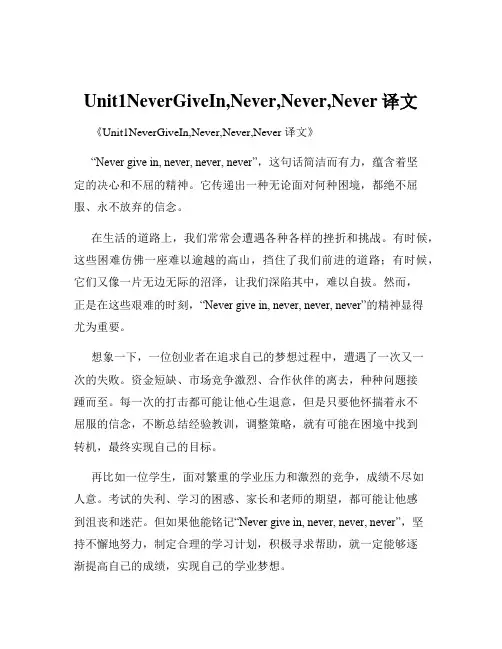
Unit1NeverGiveIn,Never,Never,Never译文《Unit1NeverGiveIn,Never,Never,Never 译文》“Never give in, never, never, never”,这句话简洁而有力,蕴含着坚定的决心和不屈的精神。
它传递出一种无论面对何种困境,都绝不屈服、永不放弃的信念。
在生活的道路上,我们常常会遭遇各种各样的挫折和挑战。
有时候,这些困难仿佛一座难以逾越的高山,挡住了我们前进的道路;有时候,它们又像一片无边无际的沼泽,让我们深陷其中,难以自拔。
然而,正是在这些艰难的时刻,“Never give in, never, never, never”的精神显得尤为重要。
想象一下,一位创业者在追求自己的梦想过程中,遭遇了一次又一次的失败。
资金短缺、市场竞争激烈、合作伙伴的离去,种种问题接踵而至。
每一次的打击都可能让他心生退意,但是只要他怀揣着永不屈服的信念,不断总结经验教训,调整策略,就有可能在困境中找到转机,最终实现自己的目标。
再比如一位学生,面对繁重的学业压力和激烈的竞争,成绩不尽如人意。
考试的失利、学习的困惑、家长和老师的期望,都可能让他感到沮丧和迷茫。
但如果他能铭记“Never give in, never, never, never”,坚持不懈地努力,制定合理的学习计划,积极寻求帮助,就一定能够逐渐提高自己的成绩,实现自己的学业梦想。
历史上也有许多伟人,他们在面对巨大的困难和压力时,始终坚守着永不屈服的精神。
例如,孙中山先生在推翻封建帝制的过程中,遭遇了无数的挫折和困难,但他从未放弃,始终坚信民主共和的理念,最终为中国的近代化进程做出了巨大的贡献。
又比如,在第二次世界大战期间,英国面临着纳粹德国的强大威胁。
在那个黑暗的时刻,丘吉尔发表了著名的演讲,激励着英国人民“Never give in, never, never, never”。
正是这种坚定的信念,让英国人民团结一心,共同抵抗外敌,最终迎来了胜利的曙光。
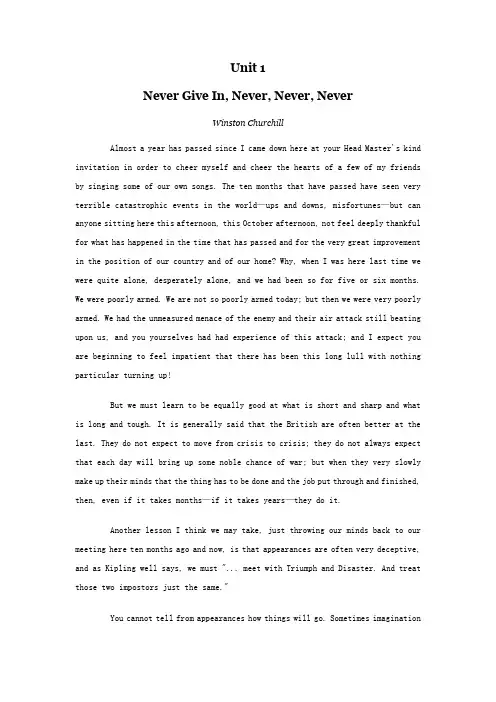
Unit 1Never Give In, Never, Never, NeverWinston ChurchillAlmost a year has passed since I came down here at your Head Master's kind invitation in order to cheer myself and cheer the hearts of a few of my friends by singing some of our own songs. The ten months that have passed have seen very terrible catastrophic events in the world—ups and downs, misfortunes—but can anyone sitting here this afternoon, this October afternoon, not feel deeply thankful for what has happened in the time that has passed and for the very great improvement in the position of our country and of our home? Why, when I was here last time we were quite alone, desperately alone, and we had been so for five or six months. We were poorly armed. We are not so poorly armed today; but then we were very poorly armed. We had the unmeasured menace of the enemy and their air attack still beating upon us, and you yourselves had had experience of this attack; and I expect you are beginning to feel impatient that there has been this long lull with nothing particular turning up!But we must learn to be equally good at what is short and sharp and what is long and tough. It is generally said that the British are often better at the last. They do not expect to move from crisis to crisis; they do not always expect that each day will bring up some noble chance of war; but when they very slowly make up their minds that the thing has to be done and the job put through and finished, then, even if it takes months—if it takes years—they do it.Another lesson I think we may take, just throwing our minds back to our meeting here ten months ago and now, is that appearances are often very deceptive, and as Kipling well says, we must "... meet with Triumph and Disaster. And treat those two impostors just the same."You cannot tell from appearances how things will go. Sometimes imaginationmakes things out far worse than they are; yet without imagination not much can be done. Those people who are imaginative see many more dangers than perhaps exist; certainly many more will happen; but then they must also pray to be given that extra courage to carry this far-reaching imagination. But for everyone, surely, what we have gone through in this period—I am addressing myself to the school—surely from this period of ten months this is the lesson: never give in, never give in, never, never, never, never—in nothing, great or small, large or petty—never give in except to convictions of honour and good sense. Never yield to force; never yield to the apparently overwhelming might of the enemy. We stood all alone a year ago, and to many countries it seemed that our account was closed, we were finished. All this tradition of ours, our songs, our school history, this part of the history of this country, were gone and finished and liquidated.Very different is the mood today. Britain, other nations thought, had drawn a sponge across her slate. But instead our country stood in the gap. There was no flinching and no thought of giving in; and by what seemed almost a miracle to those outside these islands, though we ourselves never doubted it, we now find ourselves in a position where I say that we can be sure that we have only to persevere to conquer.You sang here a verse of a school song: you sang that extra verse written in my honour, which I was very greatly complimented by and which you have repeated today. But there is one word in it I want to alter—I wanted to do so last year, but I did not venture to. It is the line: "Not less we praise in darker days."I have obtained the Head Master's permission to alter darker to sterner. "Not less we praise in sterner days."Do not let us speak of darker days: let us speak rather of sterner days. These are not dark days; these are great days—the greatest days our country has ever lived; and we must all thank God that we have been allowed, each of us according to our stations, to play a part in making these days memorable in the history ofour race.绝不屈服,绝不,绝不,绝不温斯顿·丘吉尔1 将近一年前,应贵校校长盛情邀请,我来到这里唱了几首我们自己的歌曲,既为自己加油,也为一些朋友打气。
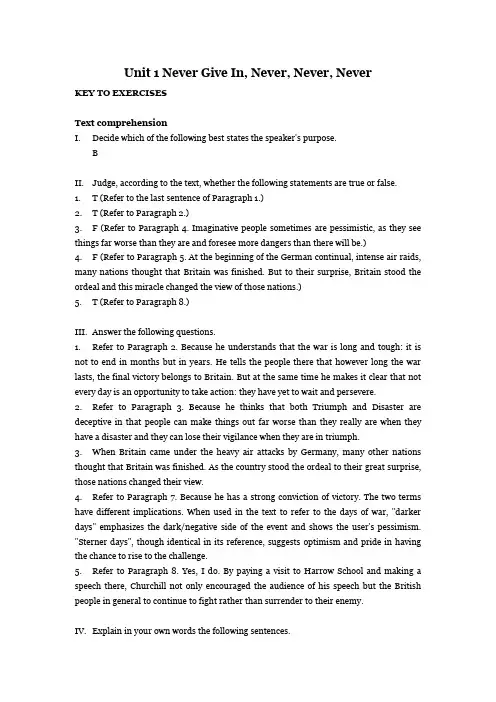
Unit 1 Never Give In, Never, Never, NeverKEY TO EXERCISESText comprehensionI. Decide which of the following best states the speaker's purpose.BII. Judge, according to the text, whether the following statements are true or false.1. T (Refer to the last sentence of Paragraph 1.)2. T (Refer to Paragraph 2.)3. F (Refer to Paragraph4. Imaginative people sometimes are pessimistic, as they see things far worse than they are and foresee more dangers than there will be.)4. F (Refer to Paragraph5. At the beginning of the German continual, intense air raids, many nations thought that Britain was finished. But to their surprise, Britain stood the ordeal and this miracle changed the view of those nations.)5. T (Refer to Paragraph 8.)III. A nswer the following questions.1. Refer to Paragraph2. Because he understands that the war is long and tough: it is not to end in months but in years. He tells the people there that however long the war lasts, the final victory belongs to Britain. But at the same time he makes it clear that not every day is an opportunity to take action: they have yet to wait and persevere.2. Refer to Paragraph3. Because he thinks that both Triumph and Disaster are deceptive in that people can make things out far worse than they really are when they have a disaster and they can lose their vigilance when they are in triumph.3. When Britain came under the heavy air attacks by Germany, many other nations thought that Britain was finished. As the country stood the ordeal to their great surprise, those nations changed their view.4. Refer to Paragraph 7. Because he has a strong conviction of victory. The two terms have different implications. When used in the text to refer to the days of war, "darker days" emphasizes the dark/negative side of the event and shows the user's pessimism. "Sterner days", though identical in its reference, suggests optimism and pride in having the chance to rise to the challenge.5. Refer to Paragraph 8. Yes, I do. By paying a visit to Harrow School and making a speech there, Churchill not only encouraged the audience of his speech but the British people in general to continue to fight rather than surrender to their enemy.IV. Explain in your own words the following sentences.1. Britain has been in too long a period of stillness without taking any particular action against the enemy.2. We are sure to experience both Triumph and Disaster, but must avoid clouding our judgment through exaggerating their importance.3. Never give in unless we are convinced that it is honourable and sensible for us to do so.4. Other nations thought that Britain was completely conquered.5. We will win as long as we hold on to the end.Structural analysis of the textIn Part 2 (Paragraphs 2?) Churchill outlined the lessons to be learned from these events and how they had proved other countries wrong about Britain. In Part 3 (Paragraphs 6?) he told the audience that he wanted to change a word in the additional verse of the school song and explained why he wanted to do it.Rhetorical features of the textThe following antonyms are used in the speech: ups -- downs, short -- long, triumph -- disaster, great -- small, large -- petty, dark days -- great days. Some of these antonyms (e.g. great -- small, large -- petty) are used to express the determination of the British people to fight on for the final victory, and some of them (e.g. dark days -- great days) are used to encourage the audience not to lose hope in the face of difficulties.Vocabulary exercisesI. Explain the underlined part in each sentence in your own words.1. gladden my heart2. situation; circumstances3. threat4. splendid; heroic5. sudden small movement because of pain or fearII. Fill in the blank(s) in each sentence with a word or phrase from the box in its appropriate form.1. put through2. addressed himself to3. was going through4. Throwing our minds back to5. yielded to6. close our account7. ups and downs8. misfortunesIII. F ill in the blanks with the appropriate forms of the given words.1. catastrophically2. deceptive3. convictions4. apparently5. Perseverance6. desperation7. unflinchingly 8. courageousIV. Choose the word that can replace the underlined part in each sentence without changing its original meaning.1. C2. D3. A4. D5. B6. A7. C8. AV. Give a synonym or an antonym of the word underlined in each sentence in the sense it is used.1. Synonym: threat (danger)2. Antonym: happy (successful)3. Synonym: position4. Synonym: seemingly5. Antonym: defeat (failure)6. Synonym: retreat (shrink, withdraw)7. Synonym: praise (commend, laud)8. Synonym: destroyVI. Explain the meaning of the underlined part in each sentence.1. current2. shown3. frequently4. depressed5. try harder6. takes inGrammar exercisesI. Improve the following sentences.1. The school teaches shorthand, bookkeeping and the use of business machines.2. The sentence is difficult to understand not because of the technical vocabulary but because of the faulty syntax.3. Marian could not decide whether to start college right after high school or to get a job first.4. The Allies decided to invade Italy and then to launch a massive assault on the Normandy coast.5. The actor was stunned not only by the noise of booing but also by the sight of flyingtomatoes.6. Smoking cigarettes can be as dangerous as playing Russian roulette.7. The trip to the city is neither long nor expensive.8. You must either stay home or go with us.9. The course consists of several lectures, three written reports, and two impromptu oral presentations.10. The requirements for a chemistry degree are not as strict as the requirements / those for a medical degree.II. Combine the sentences in each of the following groups into one, using parallel constructions wherever possible.1. Heidi Ross was both rich and powerful.2. Most of the floggings and lynchings occur at harvest time, when fruit hangs heavy and ripe, when the leaves are red and gold, when nuts fall from the trees, when the earth offers its best.3. I have nothing to offer but blood, toil, tears and sweat.4. Black people in America have been neglected and underestimated for years, but their recent accomplishments in a variety of fields have made "black power" real and black pride possible.5. New students will register on Monday; second-year students will register on Tuesday, and senior students will register on Wednesday.6. The actor taught his students how to read, how to stand, how to cry and how to talk with fans.7. We cannot be worried about or terrified of the difficulties in life.8. The factory workers were ready, able, and determined to do a great job.III. F ill in the blank in each sentence with the choice you think the most appropriate.1. B2. D3. D4. C5. C6. C7. A8. BIV. Combine the sentences in each group into one or two sentences. It may be necessary to change the wording or the order in which the information is presented.1. Secretaries do not want flowers but the recognition of their abilities to help management to get more done at less cost, thus contributing to profitability. They would, therefore, like to be recognized as professional coworkers.2. In Medieval times intelligent men frequently became priests. They did so to gain influential positions, for, in spite of the number of bishops from royal families, the Church was a democratic institution in which ability could make its way.3. I miss the open fire now that most houses have central heating. Central heatingprovides warmth but it does not provide a focal point in a room, which depresses me.V. Fill in the blanks with the correct forms of the verbs given.Trains have run / have been running very badly since the railway staff began a "go-slow" last month. Several times it has taken me nearly two hours to get home whereas in normal conditions it takes me half the time, and when I returned from Brighton last week the train was over three hours late. The passengers became furious that they literally screamed at the ticket collector as they left / were leaving the platform. I have never seen passengers behave like that before.VI. Make sentences of your own after the sentences given below, keeping the underlined structures in your sentences.(Reference version)1. It seems to me that I have neglected my duty.2. They are a bunch of noisy people, unbearably noisy, and we really have to think of moving.Translation exercisesI. Translate the following sentences into Chinese.1. 但我们必须学会同样善于应付短暂而干脆与漫长而艰难的局面。
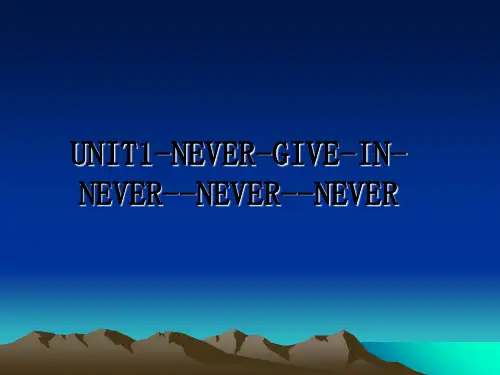
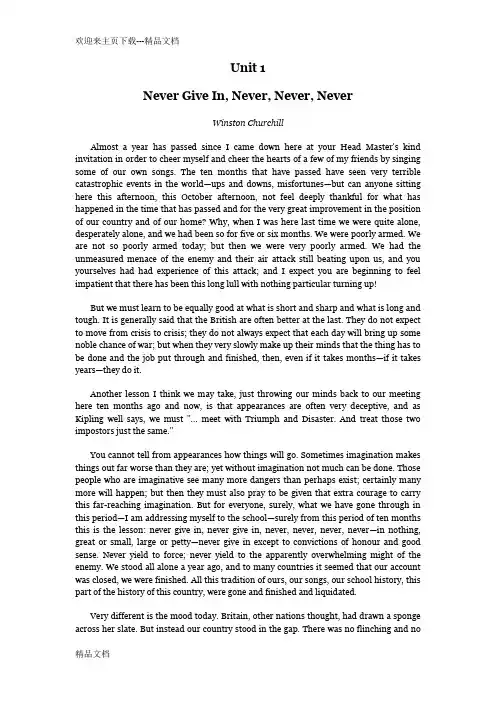
Unit 1Never Give In, Never, Never, NeverWinston ChurchillAlmost a year has passed since I came down here at your Head Master's kind invitation in order to cheer myself and cheer the hearts of a few of my friends by singing some of our own songs. The ten months that have passed have seen very terrible catastrophic events in the world—ups and downs, misfortunes—but can anyone sitting here this afternoon, this October afternoon, not feel deeply thankful for what has happened in the time that has passed and for the very great improvement in the position of our country and of our home? Why, when I was here last time we were quite alone, desperately alone, and we had been so for five or six months. We were poorly armed. We are not so poorly armed today; but then we were very poorly armed. We had the unmeasured menace of the enemy and their air attack still beating upon us, and you yourselves had had experience of this attack; and I expect you are beginning to feel impatient that there has been this long lull with nothing particular turning up!But we must learn to be equally good at what is short and sharp and what is long and tough. It is generally said that the British are often better at the last. They do not expect to move from crisis to crisis; they do not always expect that each day will bring up some noble chance of war; but when they very slowly make up their minds that the thing has to be done and the job put through and finished, then, even if it takes months—if it takes years—they do it.Another lesson I think we may take, just throwing our minds back to our meeting here ten months ago and now, is that appearances are often very deceptive, and as Kipling well says, we must "... meet with Triumph and Disaster. And treat those two impostors just the same."You cannot tell from appearances how things will go. Sometimes imagination makes things out far worse than they are; yet without imagination not much can be done. Those people who are imaginative see many more dangers than perhaps exist; certainly many more will happen; but then they must also pray to be given that extra courage to carry this far-reaching imagination. But for everyone, surely, what we have gone through in this period—I am addressing myself to the school—surely from this period of ten months this is the lesson: never give in, never give in, never, never, never, never—in nothing, great or small, large or petty—never give in except to convictions of honour and good sense. Never yield to force; never yield to the apparently overwhelming might of the enemy. We stood all alone a year ago, and to many countries it seemed that our account was closed, we were finished. All this tradition of ours, our songs, our school history, this part of the history of this country, were gone and finished and liquidated.Very different is the mood today. Britain, other nations thought, had drawn a sponge across her slate. But instead our country stood in the gap. There was no flinching and nothought of giving in; and by what seemed almost a miracle to those outside these islands, though we ourselves never doubted it, we now find ourselves in a position where I say that we can be sure that we have only to persevere to conquer.You sang here a verse of a school song: you sang that extra verse written in my honour, which I was very greatly complimented by and which you have repeated today. But there is one word in it I want to alter—I wanted to do so last year, but I did not venture to. It is the line: "Not less we praise in darker days."I have obtained the Head Master's permission to alter darker to sterner. "Not less we praise in sterner days."Do not let us speak of darker days: let us speak rather of sterner days. These are not dark days; these are great days—the greatest days our country has ever lived; and we must all thank God that we have been allowed, each of us according to our stations, to play a part in making these days memorable in the history of our race.绝不屈服,绝不,绝不,绝不温斯顿·丘吉尔1 将近一年前,应贵校校长盛情邀请,我来到这里唱了几首我们自己的歌曲,既为自己加油,也为一些朋友打气。

Unit 1 Never Give In, Never, Never, Never 译文
第一单元永不屈服,永远不要,永远不要,永远不要
在英国的二战期间,温斯顿·丘吉尔担任英国首相。
他是一个非常有影响力的领导人,他的演讲和行动鼓舞了英国人民的士气,帮助他们在困难的时期坚持下来。
其中最著名的演讲之一是他在1941年10月29日在哈罗公学发表的演讲,题为“永不屈服,永远不要,永远不要”。
丘吉尔在这次演讲中强调了英国必须坚定不移地抵抗纳粹德国的进攻,并承认这将是一场漫长而艰苦的战争。
他鼓励英国人民要保持冷静和勇气,不要放弃,不要屈服于压力和困难。
丘吉尔在演讲中说道:“我们将在海上战斗,我们将在海滩上战斗,我们将在田野和街头战斗,我们将在山地战斗;我们永远不会屈服,即使我们的岛屿或我们的帝国被摧毁,即使我们的人民在国内或海外被压迫,我们在战斗中将继续战斗,直到最后。
”
他还强调了英国的历史和传统,称赞英国人的勇气和决心,以及他们在过去的困难时期中的坚韧和毅力。
他说:“我们在过去的许多年里,已经经历了很多困难和危险,但我们从未屈服过。
我们已经度过了许多风暴和暴风雨,我们将继续这样做。
”
丘吉尔的这次演讲在当时引起了广泛的反响,被认为是英国战争期间最具影响力的演讲之一。
它表达了英国人民的决心和勇气,并鼓舞了他们在困难时期坚持下来。
这次演讲也成为了丘吉尔领导风格的代表,他的坚定和勇气在英国人心中留下了深刻的印象。

Unit1NeverGiveIn,Never,Never,Never译文Unit 1 Never Give In。
Never。
Never。
Never译文绝不屈服,绝不,绝不,绝不ChurchillXXX距离上次你们校长盛情邀请我来这里已经快一年了,上次来是为了通过演唱我们自己的校歌来鼓舞我自己以及其他一些朋友的心灵的。
在过去的十个月里,世界上发生了许多极为悲惨的事情-----起起伏伏,多灾多难-------但今天下午,这个十月的下午,在座的有谁能对过去这段时间所发生的事情以及我们国家和家园所发生的巨大改进不充满感激之情?是啊,当上次我来这里的时候,我们都非常的孤独,充满了绝望的孤独,这种状况持续了大约五六个月。
我们当时的装备很差,而如今我们的装备已不再这么差了;但当时我们的装备的确非常差。
我们受到了敌人的巨大威胁,他们的空袭至今仍在我们头顶上轰鸣,你们大家一定经历过这种空袭;我想你们大家一定开始对目前的这种局面感到烦躁,因为这种局面已经持续了很久而毫无转机。
但我们必须学会正确对待这两种情况:不管是短暂激烈的,还是长期艰难地。
人们通常都认为英国人总是在最后表现得最好。
他们不想从一种危机转入另一种危机;他们不会总是期待战争每一天都会出现好的转机;但当他们慢慢下定决心要结束这一切的时候,那么,即使是要花费几个月,甚至数年的时间,他们也会做的。
让我们把思绪拉到十个月之前我们在此相遇的情景,然后再转到现在。
另外一个我想我们可以吸取的教训是,表面的东西往往具有欺骗性。
正如吉普林所说的,我们必须“去面对胜利和灾难,并对这两种具有欺骗性的东西保持同样的态度。
”你很难处置情的表面判断它的走势。
尽管离开了设想力就做不了多少事情,但设想有时候会让事情看起来比实际情况更糟。
那些富有设想力的人会发现很多也许根本就不存在的危险;也许会有更多的危险产生,但这些人同时也要祈求能被赐予分外的勇气来蒙受这种深远的设想力。
但对所有人来说,毫无疑问,我们在这段期间所履历的-------我要告诉你们--------从这10个月的履历中所得到的经验就是:绝不屈服,绝不屈服,绝不,绝不,绝不,绝不------屈服于任何东西,不管它是巨大还是渺小,庞大还是细微-------除了对荣誉和机智外,都绝不屈服。
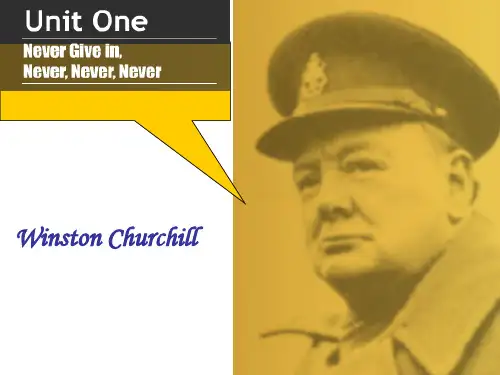
Unit 1NeverGive In, Never, Never, NeverWinsto n Church illAlmost a year has passed sinceI came down here at your Head Master's kind invita tionin orderto cheermyself and cheerthe hearts of a few of my friend s by singin g some of our own songs.The ten months that have passed have seen very terrib le catast rophi c events in the world—ups and downs,misfor tunes—but can anyone sittin g here this aftern oon, this Octobe r aftern oon, not feel deeply thankf ul for what has happen ed in the time that has passed and for the very greatimprov ement in the positi on of our countr y and of our home? Why, when I was here last time we were quitealone, desper ately alone, and we had been so for five or six months. We were poorly armed. We are not so poorly armedtoday;but then we were very poorly armed.We had the unmeas uredmenace of the enemyand theirair attack stillbeatin g upon us, and you yourse lveshad had experi enceof this attack; and I expect you are beginn ing to feel impati ent that therehas been this long lull with nothin g partic ularturnin g up!But we must learnto be equall y good at what is shortand sharpand what is long and tough. It is genera lly said that the Britis h are oftenbetter at the last. They do not expect to move from crisis to crisis; they do not always expect that each day will bringup some noblechance of war; but when they very slowly make up theirmindsthat the thinghas to be done and the job put throug h and finish ed, then, even if it takesmonths—if it takesyears—they do it.Anothe r lesson I thinkwe may take, just throwi ng our mindsback to our meetin g here ten months ago and now, is that appear ances are oftenvery decept ive, and as Kiplin g well says, we must "... meet with Triump h and Disast er. And treatthosetwo impost ors just the same."You cannot tell from appear ances how things will go. Someti mes imagin ation makesthings out far worsethan they are; yet withou t imagin ation not much can be done. Thosepeople who are imagin ative see many more danger s than perhap s exist; certai nly many more will happen; but then they must also pray to be giventhat extracourag e to carrythis far-reachi ng imagin ation. But for everyo ne, surely, what we have gone throug h in this period—I am addres singmyself to the school—surely from this period of ten months this is the lesson: nevergive in, nevergive in, never, never, never, never—in nothin g, greator small, largeor petty—nevergive in except to convic tions of honour and good sense.Neveryieldto force;neveryieldto the appare ntlyoverwh elmin g mightof the enemy. We stoodall alonea year ago, and to many countr ies it seemed that our accoun t was closed, we were finish ed. All this tradit ion of ours, our songs, our school histor y, this part of the histor y of this countr y, were gone and finish ed and liquid ated.Very differ ent is the mood today. Britai n, othernation s though t, had drawna spongeacross her slate. But instea d our countr y stoodin the gap. Therewas no flinch ing and no though t of giving in; and by what seemed almost a miracl e to thoseoutsid e theseisland s, though we oursel ves neverdoubte d it, we now find oursel ves in a positi on whereI say that we can be sure that we have only to persev ere to conque r.You sang here a verseof a school song: you sang that extraversewritte n in my honour, whichI was very greatl y compli mente d by and whichyou have repeat ed today. But thereis one word in it I want to alter—I wanted to do so last year, but I did not ventur e to. It is the line: "Not less we praise in darker days."I have obtain ed the Head Master's permis sionto alterdarker to sterne r. "Not less we praise in sterne r days."Do not let us speakof darker days: let us speakrather of sterne r days. Theseare not dark days; theseare greatdays—the greate st days our countr y has ever lived; and we must all thankGod that we have been allowe d, each of us accord ing to our statio ns, to play a part in making thesedays memora ble in the histor y of our race.绝不屈服,绝不,绝不,绝不温斯顿·丘吉尔1 将近一年前,应贵校校长盛情邀请,我来到这里唱了几首我们自己的歌曲,既为自己加油,也为一些朋友打气。
Unit 1 Never Give In, Never, Never, NeverKEY TO EXERCISESText comprehensionI. Decide which of the following best states the speaker's purpose.BII. Judge, according to the text, whether the following statements are true or false.1. T (Refer to the last sentence of Paragraph 1.)2. T (Refer to Paragraph 2.)3. F (Refer to Paragraph4. Imaginative people sometimes are pessimistic, as they see things far worse than they are and foresee more dangers than there will be.)4. F (Refer to Paragraph5. At the beginning of the German continual, intense air raids, many nations thought that Britain was finished. But to their surprise, Britain stood the ordeal and this miracle changed the view of those nations.)5. T (Refer to Paragraph 8.)III. A nswer the following questions.1. Refer to Paragraph2. Because he understands that the war is long and tough: it is not to end in months but in years. He tells the people there that however long the war lasts, the final victory belongs to Britain. But at the same time he makes it clear that not every day is an opportunity to take action: they have yet to wait and persevere.2. Refer to Paragraph3. Because he thinks that both Triumph and Disaster are deceptive in that people can make things out far worse than they really are when they have a disaster and they can lose their vigilance when they are in triumph.3. When Britain came under the heavy air attacks by Germany, many other nations thought that Britain was finished. As the country stood the ordeal to their great surprise, those nations changed their view.4. Refer to Paragraph 7. Because he has a strong conviction of victory. The two terms have different implications. When used in the text to refer to the days of war, "darker days" emphasizes the dark/negative side of the event and shows the user's pessimism. "Sterner days", though identical in its reference, suggests optimism and pride in having the chance to rise to the challenge.5. Refer to Paragraph 8. Yes, I do. By paying a visit to Harrow School and making a speech there, Churchill not only encouraged the audience of his speech but the British people in general to continue to fight rather than surrender to their enemy.IV. Explain in your own words the following sentences.1. Britain has been in too long a period of stillness without taking any particular action against the enemy.2. We are sure to experience both Triumph and Disaster, but must avoid clouding our judgment through exaggerating their importance.3. Never give in unless we are convinced that it is honourable and sensible for us to do so.4. Other nations thought that Britain was completely conquered.5. We will win as long as we hold on to the end.Structural analysis of the textIn Part 2 (Paragraphs 2?) Churchill outlined the lessons to be learned from these events and how they had proved other countries wrong about Britain. In Part 3 (Paragraphs 6?) he told the audience that he wanted to change a word in the additional verse of the school song and explained why he wanted to do it.Rhetorical features of the textThe following antonyms are used in the speech: ups -- downs, short -- long, triumph -- disaster, great -- small, large -- petty, dark days -- great days. Some of these antonyms (e.g. great -- small, large -- petty) are used to express the determination of the British people to fight on for the final victory, and some of them (e.g. dark days -- great days) are used to encourage the audience not to lose hope in the face of difficulties.Vocabulary exercisesI. Explain the underlined part in each sentence in your own words.1. gladden my heart2. situation; circumstances3. threat4. splendid; heroic5. sudden small movement because of pain or fearII. Fill in the blank(s) in each sentence with a word or phrase from the box in its appropriate form.1. put through2. addressed himself to3. was going through4. Throwing our minds back to5. yielded to6. close our account7. ups and downs8. misfortunesIII. F ill in the blanks with the appropriate forms of the given words.1. catastrophically2. deceptive3. convictions4. apparently5. Perseverance6. desperation7. unflinchingly 8. courageousIV. Choose the word that can replace the underlined part in each sentence without changing its original meaning.1. C2. D3. A4. D5. B6. A7. C8. AV. Give a synonym or an antonym of the word underlined in each sentence in the sense it is used.1. Synonym: threat (danger)2. Antonym: happy (successful)3. Synonym: position4. Synonym: seemingly5. Antonym: defeat (failure)6. Synonym: retreat (shrink, withdraw)7. Synonym: praise (commend, laud)8. Synonym: destroyVI. Explain the meaning of the underlined part in each sentence.1. current2. shown3. frequently4. depressed5. try harder6. takes inGrammar exercisesI. Improve the following sentences.1. The school teaches shorthand, bookkeeping and the use of business machines.2. The sentence is difficult to understand not because of the technical vocabulary but because of the faulty syntax.3. Marian could not decide whether to start college right after high school or to get a job first.4. The Allies decided to invade Italy and then to launch a massive assault on the Normandy coast.5. The actor was stunned not only by the noise of booing but also by the sight of flyingtomatoes.6. Smoking cigarettes can be as dangerous as playing Russian roulette.7. The trip to the city is neither long nor expensive.8. You must either stay home or go with us.9. The course consists of several lectures, three written reports, and two impromptu oral presentations.10. The requirements for a chemistry degree are not as strict as the requirements / those for a medical degree.II. Combine the sentences in each of the following groups into one, using parallel constructions wherever possible.1. Heidi Ross was both rich and powerful.2. Most of the floggings and lynchings occur at harvest time, when fruit hangs heavy and ripe, when the leaves are red and gold, when nuts fall from the trees, when the earth offers its best.3. I have nothing to offer but blood, toil, tears and sweat.4. Black people in America have been neglected and underestimated for years, but their recent accomplishments in a variety of fields have made "black power" real and black pride possible.5. New students will register on Monday; second-year students will register on Tuesday, and senior students will register on Wednesday.6. The actor taught his students how to read, how to stand, how to cry and how to talk with fans.7. We cannot be worried about or terrified of the difficulties in life.8. The factory workers were ready, able, and determined to do a great job.III. F ill in the blank in each sentence with the choice you think the most appropriate.1. B2. D3. D4. C5. C6. C7. A8. BIV. Combine the sentences in each group into one or two sentences. It may be necessary to change the wording or the order in which the information is presented.1. Secretaries do not want flowers but the recognition of their abilities to help management to get more done at less cost, thus contributing to profitability. They would, therefore, like to be recognized as professional coworkers.2. In Medieval times intelligent men frequently became priests. They did so to gain influential positions, for, in spite of the number of bishops from royal families, the Church was a democratic institution in which ability could make its way.3. I miss the open fire now that most houses have central heating. Central heatingprovides warmth but it does not provide a focal point in a room, which depresses me.V. Fill in the blanks with the correct forms of the verbs given.Trains have run / have been running very badly since the railway staff began a "go-slow" last month. Several times it has taken me nearly two hours to get home whereas in normal conditions it takes me half the time, and when I returned from Brighton last week the train was over three hours late. The passengers became furious that they literally screamed at the ticket collector as they left / were leaving the platform. I have never seen passengers behave like that before.VI. Make sentences of your own after the sentences given below, keeping the underlined structures in your sentences.(Reference version)1. It seems to me that I have neglected my duty.2. They are a bunch of noisy people, unbearably noisy, and we really have to think of moving.Translation exercisesI. Translate the following sentences into Chinese.1. 但我们必须学会同样善于应付短暂而干脆与漫长而艰难的局面。